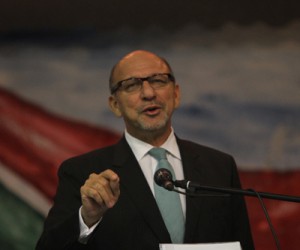Developments in infrastructure both physical and financial, and deeper economic integration, will be key to sustained growth in Africa, according to a panel of business and political leaders at the World Economic Forum's (WEF's) annual meeting in Davos, Switzerland.
The discussion centred on Africa's 'resilient dynamism' – the theme of this year's annual meeting – and featured a keynote address from South African Finance Minister Pravin Gordhan, with a panel featuring Trade and Industry Minister Rob Davies, Absa CEO Maria Ramos and Transnet CEO Brian Molefe.
The panel was extremely optimistic about Africa's future. While the United States and Europe battle political gridlock and mounting debt, Africa has remained one of the few bright spots for economic activity.
The continent saw growth of more than five percent in 2012 and is projected to see the same in 2013, according to the International Monetary Fund (IMF).
"In a world that is troubled with slow or no growth, which is struggling with the impact of unemployment, both business and government have serious challenges ahead. Collectively, we must balance the need for short-term solutions to immediate challenges, while making a long-term commitment to sustainable growth and implementing a sound political and economic framework." Gordhan said in his address.
Africa, and South Africa in particular, are clear embodiments of this year's Davos theme, showing resilience in the face of a challenging global economic climate. South Africa has ranked in the WEF Global Competitiveness Index (GCI) as being among the best places in the world for corporate governance, regulation of the financial system and availability of financial services.
Davies highlighted the need for African countries to not just broaden their economic and trade ties, but to deepen their relationships – something he said was being achieved through the development of a free trade area covering 26 countries on the continent.
Davies said the absence of sovereign debt crises, alongside better governance across the continent, had gone a long way to creating an environment where African investments saw long-term growth and returns capable of creating sustained development across the continent.
Both Ramos and Molefe agreed that infrastructure development created opportunities for both investors and the African people, with more than 80 percent of Africans remaining unbanked and 70 percent without access to internet.
Despite the resilience and dynamism currently being seen across the continent, unemployment and labour market instability had to be tackled to sustain the growth of the African continent. According to Davies, there was no 'magic bullet' for unemployment, and job creation could not be seen as simply an incidental outcome of growth, but had to be targeted in its own right.
There had to be commitments from labour, business and the government to address practical matters and in particular youth unemployment, Gordhan said, with training and skills development being critical.






